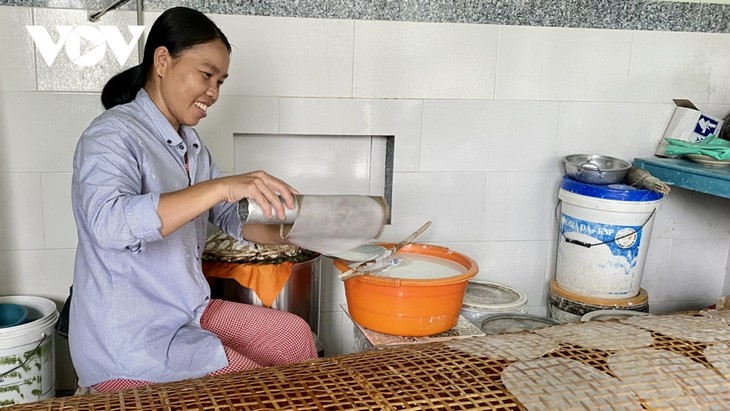(VOVWORLD) -Many agricultural products of Ba Ria-Vung Tau province have proved profitable. Making rice paper in An Ngai commune, Long Dien district, for example, has generated jobs and increased local incomes.
 Rice paper making in An Ngai commune has helped increase people's income and preserve the national cultural identities. Rice paper making in An Ngai commune has helped increase people's income and preserve the national cultural identities. |
Rice paper has been made in An Ngai commune for a long time. After each rice harvest, what the villagers don’t sell to traders, they grind into flour to make rice paper that can be eaten later. At first this rice paper was just for each family’s needs. Now rice paper is made to be sold.
70-year-old Truong Van Hien of An Hoa hamlet says his family has made rice paper for four generations and now it is his turn to pass the craft on to his daughter.
Making rice paper doesn’t cost much because the ingredients are all locally grown, and straw and rice husks can be used for fuel. The work is done between 4:00 a.m. and 12:00 noon. In a few hours one person can make 1,200-1,500 sheets of rice paper and earn more than 10 USD.
Hien says many households in the area now use electric stoves instead of rice husk-burning stoves to make the paper. Using blenders to grind the flour save even more time. He told VOV that the craft has been around for a long time, but the income from it has been unstable.
“Training courses have been created for the villagers and they have been encouraged to set up cooperatives to stabilize production and create a brand name. The State has gotten people to join the One Commune One Product Program to give their products a more secure foothold in the market and improve their lives,” said Hien.
An Ngai commune has 130 households engaged in the rice paper craft, employing 260 workers. Like most other traditional crafts in this region, An Ngai rice paper uses a small-scale household-based economic model.
The Long Dien administration wants to preserve and develop the craft by helping locals to improve the quality of their rice paper and use the OCOP program to promote the An Ngai brand and expand its market. Le Thi Hoang Oanh, former Chairwoman of the An Ngai commune People's Committee and now Deputy Head of the Organization Commission of the Long Dien district Party Committee, said rice paper making households need equipment.
“The Rural Development Department has coordinated with the district administration to help local farmers transfer their production from wood- or rice husk-burning stoves to electric stoves,” said Hoang Anh, adding, “Households have also been given electric mills to grind the flour and bamboo frames to dry the rice paper.”
Ba Ria-Vung Tau province has established rice paper cooperatives and reorganized the purchasing process for stabilized product prices. Loans have been given to craft households to upgrade their equipment, access clean water, and expand their consumer and export markets.
Phan Van Hen, 65, of An Loc hamlet, who began making rice paper 40 years ago, said, “The State provides support for local rice paper making households to preserve the traditional craft village and boost economic development.”
An Ngai was recognized as the first traditional craft village in Ba Ria-Vung Tau in 2013. The provincial Tourism Department intends to help craft villages like An Ngai get officially recognized as a tourist destination.